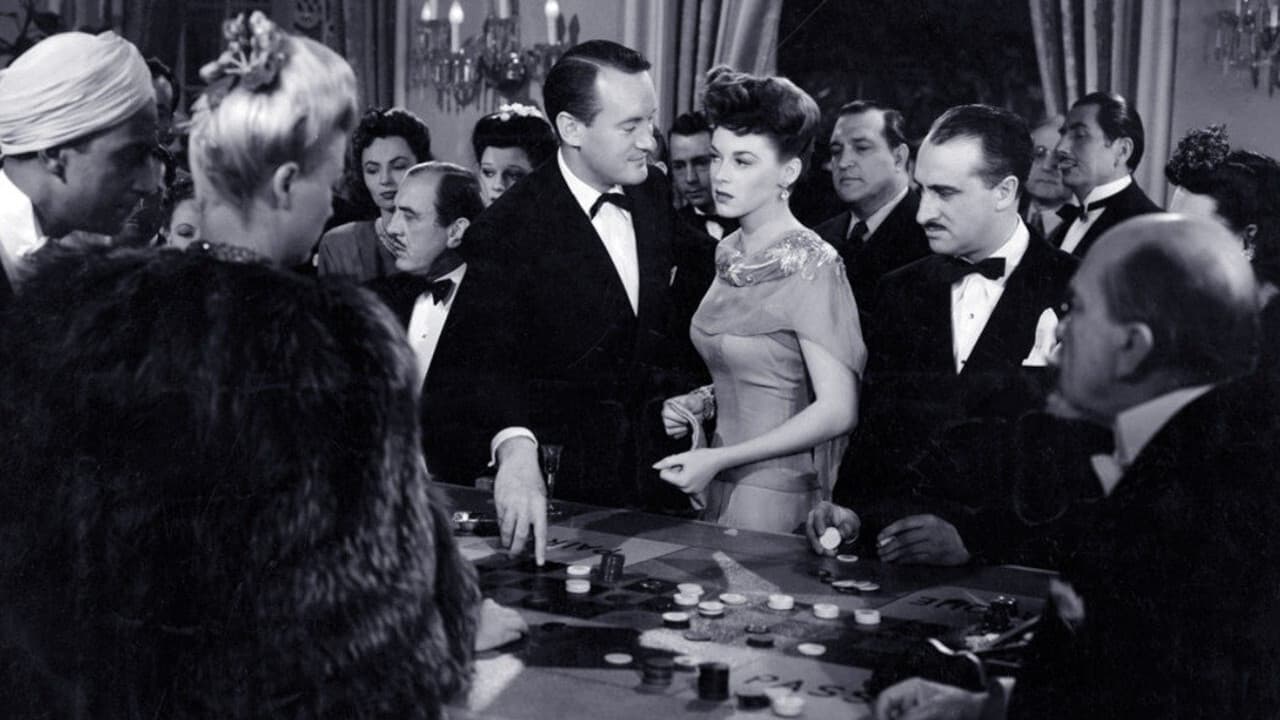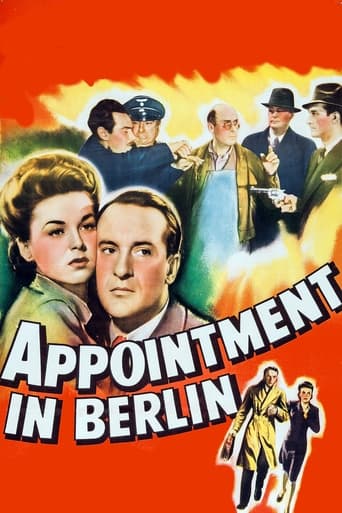

Purely Joyful Movie!
... View MoreThis movie feels like it was made purely to piss off people who want good shows
... View MoreClose shines in drama with strong language, adult themes.
... View MoreOne of the film's great tricks is that, for a time, you think it will go down a rabbit hole of unrealistic glorification.
... View MoreOne interesting thing about "Appointment in Berlin" is that it shows the mixed attitudes of the Brits in the time leading up to World War II. That includes different opinions among the military, and public expressions of disagreements. Few films made during the war, or after, show this. The same thing was true in the U.S. There were strong divisions of public opinion. Many wanted the U.S. to stay out of any conflict in Europe. Others were anxious for America to help defend Europe from the growing Nazi tyrannies and threats. I suppose that after December 7, 1941, when much of the world was at war, movie makers didn't see much sense in spending film space to cover the divisions of public opinion before the war. But I think it is very important that we remember this for history and for lessons it may hold for today and the future. So, this film has some historical value in that regard. The plot is quite original with some very unusual twists even for the genre of espionage. For instance, how many people would be willing to go to prison for 18 months, and endure public disgrace, as part of a ploy to becoming an espionage agent? There were some far-fetched things done during the war – many that the public didn't learn about for decades after the war. And, by now, most people should realize that almost anything is possible in the realm of clandestine operations. George Sanders played his role perfectly as Keith Wilson. He was a dissident, then discharged, then dishonored RAF Wing Commander. The answer to the rhetorical question I asked – who would endure prison and such disgrace – is, "A true patriot." And Wilson's role makes it clear that he is a true English patriot. In the scene when the secret service recruits Wilson, Col. Patterson (played very well by Alan Napier) says he knows of no one who cares more about England than Wilson. His resolution for the sacrifice he is about to make in suffering dishonor and serving a prison term is reinforced on Wilson's face when he looks at a British flag on a building as his car drives by it. The romance aspect of this film is more legitimate than many that seem to be thrown into wartime movies to give them more public appeal. In this case, Ilse Von Preising is the attractive German woman whom Wilson must pursue in England and then on the Riviera. Through her, he hopes to get into the Nazi propaganda field in which her brother, Rudolph, is a top officer. Marguerite Chapman plays Ilse, and the relationship blossoms into love, but it isn't played up very much. Ilse initially falls for Wilson but then cools when he seems to so eagerly embrace the Nazi way. She changes again toward the end when she finds out Wilson is a British agent. Her character seems cool throughout, and somewhat wooden at times. Wilson too, shows uncertainty about her in his face at times. He can't figure out if she is a hard core Nazi, or if she has sympathies for the Allies. The rest of the cast for the film are good in their roles. Among the major supporting roles are Onslow Stevens as Rudolph, Gale Sondergaard as Greta Van Leyden, and Steven Geray as Henri Rader. He is the owners of the Riviera casino and a Nazi supporter. Two American broadcast reporters, Babe Forrester and Bill Banning, are played well by Jack Lee and Don Douglas, respectively. "Appointment in Berlin" is a Columbia movie released in America on July 15, 1943. IMDb doesn't have any information on when (or if) it was released in Great Britain. Since it's about British intelligence in the war, I would think it would have been shown in England. But, maybe there was a reason for not showing it across the pond during the war. The story and screenplay are very good. The directing and acting are good. I couldn't find much information about the shooting locations, so it most likely was filmed all in the U.S. Columbia's lots would have worked for the London and Berlin scenes, and the southern France coastline was most likely shot somewhere on the California coast. At times, the scenes seem stagy – as though they were on a studio lot and not out in the real world. Only one aspect of the movie is quite terrible. The scene at the end with the bombing of the Nazi ships and invasion craft on the Frisian Islands. It's clear that this scene is all models and not real. The explosions and crashing planes are OK, but the antiaircraft searchlights are very amateurish. They look like what they most likely were – white strips pasted on a black background and then quickly covered or removed when they were bombed. The ending may not suit some people, but it is a fitting one, especially for the leads, Keith Wilson and Ilse Von Preising. Some see this as a propaganda film, but it's clearly an action film about espionage. It does have a subtle message to audiences that all may not be as it appears regarding people and events during war. This is a movie worthy having in any good World War II film collection.
... View MoreGeorge Sanders stars with Marguerite Chapman in "Appointment in Berlin," a 1943 film directed by Alfred E. Green.Sanders plays Keith Wilson, who is disgusted by his fellow Brits believing that Hitler will abide by any non-aggression treaty and speaks out against their passivity. Because he is an RAF officer, he is dismissed from the service. A friend (Alan Napier) in the secret service recruits him to pose as a traitor/Nazi sympathizer and spy for England.Wilson is given the job of doing radio broadcasts, and by embedding a code in his speeches, he is able to give valuable information to Britain. Meanwhile, he falls for his Nazi boss' sister Ilse (Chapman), who seems unsupportive of her brother's actions.Though this is kind of a downer - it's about war, after all - it's a good movie. Sanders gives his usual smooth, charming performance, though I think he was capable of much more. He had a wonderful voice and screen presence and livened up many a film.I also liked Gail Sondergaard as a member of the underground. I actually didn't find Marguerite Chapman was all that good, though very pretty. Many years ago, before the Internet, I used to get a magazine for memorabilia collectors, and she had an ad in the classifieds to sell her personal memorabilia. I actually wasn't familiar with her at that time.Worth seeing.
... View More***SPOILERS*** Disgusted and feeling humiliated in his country the UK selling out Czechoslovakia to Hitler's Nazi Germany RAF fly-boy Keith Wilson, Georger Sanders, starts to shoot off his mouth against his country. This has the very disgruntled Wilson end up being recruited by UK MI5 big wig Col. Patterson, Alan Napier, to do some undercover work for King and Country in Berlin. Getting to know and work for top propaganda chief Rudolph Von Parssing,Onslow Stevens, Keith is in the perfect position to tell the free world, by them Germany was at war with the UK, what's really going on in his coded radio messages on Radio Berlin's top rated show "The Voice of Truth".Sanders or Keith is also given a love interest in the movie non other then his boss' pretty and refined sister Ilse, Marquerite Chapman, who's just crazy about the guy. So crazy that she switches sides in mid flight and joins him when he finally reveals who he is and who he works for; the U.K! It's then that things really start to heat up in the movie with Ilse now willing to put her life on the line to save both Keith and his country from a German land sea and air invasion! Which by the time the film is over she in fact does!***SPOILERS*** Keith himself in getting through to the UK information about the impending German invasion throws caution to the wind and in a kamikaze style suicide attack, in a hijacked German plane, ignites a number of giant oil tankers lighting up the skies to direct the RAF to their target. The German armada docked on the Holland coast waiting to do a D-Day in reverse against Great Britain! A bit strained in Sanders or RAF pilot Keith Wilson getting away all throughout the movie masquerading around as a Nazi who seemed to have trouble being one! You can easily see that Keith's heart wasn't in it. If I could spot that it's a wonder his on the ball Nazi controllers couldn't.
... View MoreSeen this movie recently, strongly feel that Ilse's death is just not worth it, I think that's some kind of stupid. But I don't know why she became an assistant to her evil brother, because it's just him who killed her at last.Over all, I think George Sanders is quite charming and his levelheaded behavior in the movie made me admire him even more.And this movie made me think about Bogart's Sahara because they all filmed during the war.
... View More